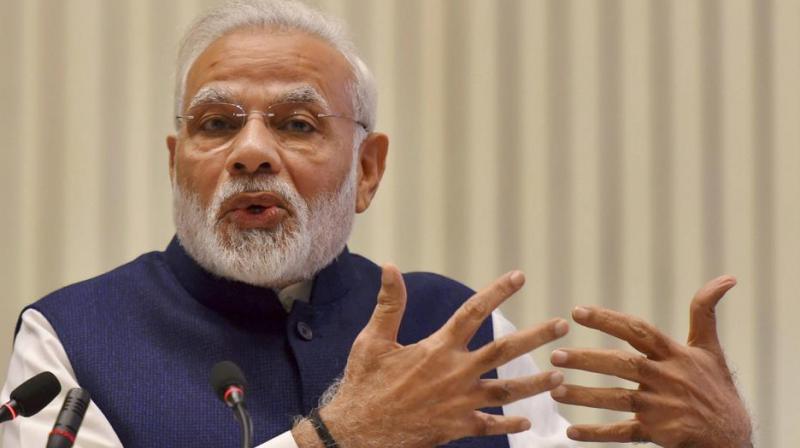Will Balakot airstrike be Modi's winning card?

Propaganda is a legitimate political tool, but it does not help in winning wars, nor elections. Prime Minister Narendra Modi and his BJP seem quite geared up to fight this summer’s Lok Sabha election on a war with Pakistan that has not been fought. As the proverbial single swallow does not make a summer, so a single aerial attack on the Jaish-e-Mohammed (JeM) camp at Balakot in Pakistan does not mark it as a war either on terrorism or on Pakistan. It is at best an overture, and a weak one at that. So Mr Modi harping on the Indian Air Force’s sortie over the JeM camp is propaganda, and one cannot object to it. In a democratic polity, propaganda is part of the right to freedom of expression. But boasting about the Balakot attack is ineffective even in terms of propaganda. It is not necessary to ask for proof about the damage wrought by the Mirage-2000s.
What is laughable in the Prime Minister’s campaign rhetoric is that he is staking his five-year term in office on a short single event of the bombing. He does not seem to be confident of the other things he believes he has achieved — making 98 per cent of the country open defecation free (ODF) as part of his Swachchh Bharat Mission (SBM) or extending electricity connection to the 18,000 villages that remained to be electrified and of more than doubling the number of bank accounts as part of the financial inclusivity through the Dhan Jan Yojana scheme. It appears that the Prime Minister feels that there cannot be anything more exciting than a warlike exploit to win an election.
Political pundits have declared that after the Balakot airstrikes, Mr Modi and his party have turned the tables on the aggressive Opposition which was clawing its way back, and that the Prime Minister has ensured the electoral victory of his party for a second consecutive term through his decision to bomb the JeM camp in Balakot. But the experts could be wrong. Even in Uttar Pradesh, the state where the BJP has the unenviable task of repeating its 2014 performance of winning 73 of 80 Lok Sabha seats, the talk of war does not fetch brownie points. People of a backward state like UP are shrewder than the pundits and propagandists. It is not the September surgical strike that won the BJP the massive mandate in the March 2017 Assembly election in the state. Nor was it the subversive demonetisation, which financially choked the Opposition parties and left the BJP with enough funds in its hands. There were other earthy reasons as to why the people of the most populous states voted for the party. The number of the seats won by the BJP in the UP Assembly is disproportionate to the preference of the people.
Of course, there is a thinly-veiled separation this time around about how the decision was taken. In September 2016, the surgical strike was attributed to the direction given by the Prime Minister. The February 26 aerial attack was preceded by Mr Modi’s declaration that the armed forces were given a free hand to take appropriate action. There was, of course, never any doubt that the political credit will be claimed by the redoubtable Prime Minister. Mr Modi never made any bones about his image of a political leader with a swagger, and he is now flaunting the Balakot attack as his government’s glittering trophy. It is one of the major drawbacks of a right-wing party like the BJP that it believes in martial glory because it is more an act of psychological overcompensation for a weak ego rather than an act of bravery. A brave person never boasts. Mr Modi and the BJP can’t resist the temptation of being boastful. It only exposes the chink in the psyche of right-wing leaders and their cadres.
The Pulwama suicide attack is part of a running battle with jihadi groups like the JeM and Lashkar-e-Tayyeba (LeT). The terrorists have been waging war against India in Punjab in 1980s and in Jammu and Kashmir since the 1990s. They have not succeeded in denting the unity and integrity of India despite their delusional words and deeds. Successive governments at the Centre have dealt with it, and the security forces have held the terrorists at bay through nearly four decades.
It was quite immature of Mr Modi to insert the claim in this narrative of dealing with terrorism that he has done much better than the Congress-led UPA government after the November 26, 2008, terrorist attack in Mumbai. A large country like India should not be indulging in a tit-for-tat spat with terrorists. The aim should be to destroy the terrorist bases, and it is not a one-off operation. It is a long-drawn one and it is to be carried out quietly in order to be effective. There will be setbacks and victories in this war against terrorism. Pulwama was a setback. Balakot was a victory. But they are not an end in themselves.
It could be the case that Mr Modi is aware more than his critics that the Balakot aerial attack has limited strategic value, but he is using it as a calibrated electoral card. But he may be overlooking the fact that the people too will be making their choice with as much deliberation. Mr Modi has opened his cards for all to see. The people have not. They show their cards only on the polling day. The pundits should have held their counsel instead of pronouncing that the Balakot aerial attack was Mr Modi’s winning card.

